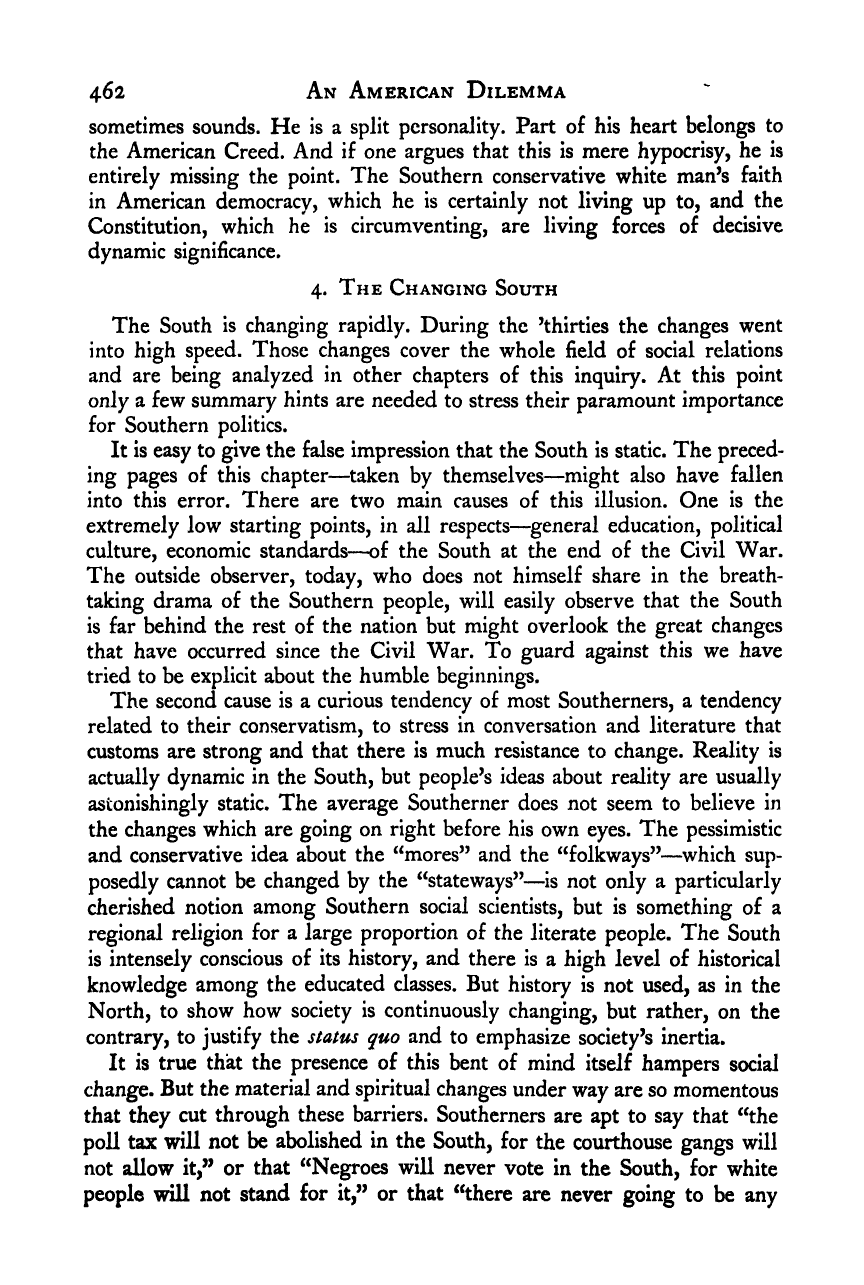Note: Gunnar Myrdal died in 1987, less than 70 years ago. Therefore, this work is protected by copyright, restricting your legal rights to reproduce it. However, you are welcome to view it on screen, as you do now. Read more about copyright.
Full resolution (TIFF) - On this page / på denna sida - V. Politics - 21. Southern Conservatism and Liberalism - 3. Is the South Fascist? - 4. The Changing South

<< prev. page << föreg. sida << >> nästa sida >> next page >>
Below is the raw OCR text
from the above scanned image.
Do you see an error? Proofread the page now!
Här nedan syns maskintolkade texten från faksimilbilden ovan.
Ser du något fel? Korrekturläs sidan nu!
This page has never been proofread. / Denna sida har aldrig korrekturlästs.
462 An American Dilemma
sometimes sounds. He is a split personality. Part of his heart belongs to
the American Creed. And if one argues that this is mere hypocrisy, he is
entirely missing the point. The Southern conservative white man’s faith
in American democracy, which he is certainly not living up to, and the
Constitution, which he is circumventing, are living forces of decisive
dynamic significance.
4. The Changing South
The South is changing rapidly. During the ’thirties the changes went
into high speed. Those changes cover the whole field of social relations
and are being analyzed in other chapters of this inquiry. At this point
only a few summary hints are needed to stress their paramount importance
for Southern politics.
It is easy to give the false impression that the South is static. The preced-
ing pages of this chapter—taken by themselves—might also have fallen
into this error. There are two main causes of this illusion. One is the
extremely low starting points, in all respects—^general education, political
culture, economic standards—of the South at the end of the Civil War.
The outside observer, today, who does not himself share in the breath-
taking drama of the Southern people, will easily observe that the South
is far behind the rest of the nation but might overlook the great changes
that have occurred since the Civil War. To guard against this we have
tried to be explicit about the humble beginnings.
The second cause is a curious tendency of most Southerners, a tendency
related to their conservatism, to stress in conversation and literature that
customs are strong and that there is much resistance to change. Reality is
actually dynamic in the South, but people’s ideas about reality are usually
astonishingly static. The average Southerner does not seem to believe in
the changes which are going on right before his own eyes. The pessimistic
and conservative idea about the “mores” and the “folkways”—which sup-
posedly cannot be changed by the “stateways”—is not only a particularly
cherished notion among Southern social scientists, but is something of a
regional religion for a large proportion of the literate people. The South
is intensely conscious of its history, and there is a high level of historical
knowledge among the educated classes. But history is not used, as in the
North, to show how society is continuously changing, but rather, on the
contrary, to justify the status quo and to emphasize society’s Inertia.
It is true that the presence of this bent of mind itself hampers social
change. But the material and spiritual changes under way are so momentous
that they cut through these barriers. Southerners are apt to say that “the
poll tax will not be abolished in the South, for the courthouse gangs will
not allow it,” or that “Negroes will never vote in the South, for white
people will not stand for it,” or that “there are never going to be any
<< prev. page << föreg. sida << >> nästa sida >> next page >>